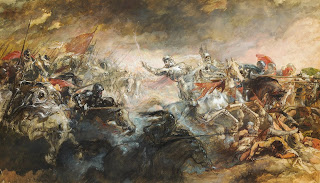The History of Technology: From the Wheel to the Internet
The history of technology is a wide-ranging and complex topic. It spans from ancient times to the modern day, and encompasses all manner of technological developments. This post will introduce some of the most important developments in technology, and how they changed the world. Our world is getting smaller and more interconnected. Technology has allowed us to communicate with people from all over the world, and you’ve probably heard about the Internet.
The history of technology is a fascinating subject. From the earliest of days to modern-day, technology has been progressing at an exponential rate. The history of technology is littered with inventions - some good, some bad and some completely unexpected.
This section will take you on a journey through time to explore the progression of technologies over the last century or so.
Technology has been in use for thousands of years. From the time when people started using tools to make their everyday life easier to the invention of the internet and AI.
Technology has impacted every aspect of our lives, including what we eat, how we work, and how we communicate with each other. It's worth remembering that as new technologies are created, they will have a ripple effect that will touch more aspects of our lives.
—
Technology has been the driving force for most of the changes in the world. The first technologies were developed to serve practical purposes and allowed humans to carry out tasks more efficiently.
The history of technology is a long one that spans millennia. It all started with primitive tools for hunting and gathering, followed by animal power, and finally, the introduction of machines driven by steam, electricity, and internal combustion engines.
Technology has been around as long as human beings have walked on earth but it wasn't until recent years that it's had such a huge impact on our lives. Technological advances have helped us in every facet of life; we can now communicate with customers or friends across continents within seconds or use technology to gain an education from the comfort of our homes.
Technology has always been changing, and this poses new challenges for society in terms of adapting to these changes.
Technology has always been changing, and this poses new challenges for society in terms of adapting to these changes. In the future, the pace of change will only increase and it will be crucial for people to learn how to adapt their skills at a younger age.
The history of AI as we know it today can be traced back to the 1950s, when a proposal was made by computer scientist Alan Turing. In this proposal, he laid out a blueprint for what would eventually come to be known as artificial intelligence and proposed what is now known as the “Turing Test”. The idea was that if a person could not tell whether they were interacting with another person or a computer program, then the computer program would have reached something akin to human intelligence.
This paper will analyze the historical context of how AI has evolved from its earliest beginnings in 1950 to what it is today, and what we might see in the near future.
Technology has evolved in many ways over the years. From the first typewriter to augmented reality, the way we work and communicate has changed dramatically.
In 1873, Christopher Latham Sholes patented the first typewriter. It took a few short years before his creation was commercialized by E. Remington & Sons in 1878. The typewriter replaced pen and paper as it became easier to produce documents faster than ever before.
In 1968, Douglas Engelbart invented the computer mouse and demoed it at a conference of computer specialists in San Francisco which is now known as “The Mother of All Demos” - where he introduced his invention to a rapt audience of engineers who were completely unaware that such a device could even exist (Wikipedia).
Technology has been evolving for centuries and it has made our lives better in many ways.
Many historians say that the first technology was created with the discovery of fire and tools to control it. However, others argue that natural phenomena like lightning were what really started humans on their technological journey. But regardless of which historical event is the real beginning of technology, one thing remains clear: technology is a part of who we are as human beings.
We have come a long way from ancient man hunting with spears to today's world where we have mastered interstellar travel in only one hundred years or so. This rapid development would not be possible without the help of technology and its history
 The history of technology is a complex one. It starts with the creation of the wheel and continues with advancements in communication, transportation, and finally computers. Technology has been an integral part of our lives for so long that it might be difficult to imagine a world without it.
The history of technology is a complex one. It starts with the creation of the wheel and continues with advancements in communication, transportation, and finally computers. Technology has been an integral part of our lives for so long that it might be difficult to imagine a world without it.
In this guide, you will learn about some key moments in the history of technology and how they have changed our world. We'll also discuss the future of tech and how we might use these advances to help make the world a better place.
—
Technology is one of the most important aspects of our lives and it has had a huge impact on us.
Technology has shaped our society in many ways. One example is that people have more time to work because of technology, which means they are able to buy more goods and services. Technology development has also led some people to live in seclusion from society. For example, some people prefer to use a device called an e-reader instead of reading paper books.
 The history of technology dates back all the way to 2600 BC when humans first invented writing and used it for recording purposes. History also includes any inventions that have had an impact on our society today, like the invention of the internet or smartphones.
The history of technology dates back all the way to 2600 BC when humans first invented writing and used it for recording purposes. History also includes any inventions that have had an impact on our society today, like the invention of the internet or smartphones.
How it all began
The development of technology is incredibly important. We wouldn’t be here without it, but we’re also responsible for a lot of the problems it brings with it. We have put much of the world’s energy into developing more efficient and powerful technology, but we haven’t had a great deal of thought about how this could impact the planet. But the biggest problem with progress is that it leaves behind all kinds of problems. It can wipe out entire species, cause massive changes to the environment, and even allow corruption and oppression to flourish. It’s time to take a step back, and ask what we want our society to look like in 20 or 50 years. Is it better to have amazing technology and create huge social changes, or is that simply changing things too much?
Following is a list indicating the top 20 technological developments of the 20th century. This list has been prepared by the national academy of engineering, United States.
Ranking in this list have been defined according to debate between various experts from related technological fields:
1. Electrification
2. Automobile
3. Airplane
4. Water supply and distribution
5. Electronics
6. Radio and television
7. Mechanized agriculture
8. Computers
9. Telephone
10. Air conditioning and refrigeration
11. Highways
12. Spacecraft
13. Internet
14. Imaging technology
15. Household appliances
16. Health technology
17. Petroleum and petrochemical technologies
18. Laser and fiber optics
19. Nuclear technology
20. Materials sciences
Remember that these ranks are according to their importance and not according to the timeline in which they were invented. Technology in 21st Century We are currently living in quiteearly phase of the 21st century.
However, development and technological advancements achieved in this short time span can easily beat researchers done in the entire 19th century. Following is a list giving a quick glance at technological developments and fields achieved in the 21st century until now.
 Quantum computers have been introduced Research is going on in gene therapy that was introduced back into 1990 AD 3D printing has touched new heights like never before, original concepts introduced in 1981 AD Nanotechnology Bioengineering and biotechnology Nuclear technology Many advanced materials are introduced/discovered like grapheme The scramjet and drones are being used by the military since they can be equipped with high energy laser and rail guns Conduct of superconductivity has been introduced The memristor Development of green technology and alternative fuels such as fuel cells, self-driving electric cars, plug-in hybrid cars, etc.
Quantum computers have been introduced Research is going on in gene therapy that was introduced back into 1990 AD 3D printing has touched new heights like never before, original concepts introduced in 1981 AD Nanotechnology Bioengineering and biotechnology Nuclear technology Many advanced materials are introduced/discovered like grapheme The scramjet and drones are being used by the military since they can be equipped with high energy laser and rail guns Conduct of superconductivity has been introduced The memristor Development of green technology and alternative fuels such as fuel cells, self-driving electric cars, plug-in hybrid cars, etc.
Augmented reality devices and wearable electronics have been developed Who can forget the artificial intelligence in the list? Powerful LEDs Solar cells IC technology for computers(integrated circuits) Wireless power devices Electronic / fuel engines Portable and powerful batteries All this achieved in time span of barely one and a half-decade! The large Hadrons Collider is considered the greatest (both in technique and size as well) research tool built in the 21st century.
It is the largest machine ever in entire human history. It is expected that instruments such as larger particle accelerators such as LHCand neutrino detectors will help to increase our understanding and knowledge about particle physics. Underground detectors are constantly involved in the activity sought-ing dark matter.
On the other hand, observatories such as LIGO are working in order to detect and understand about gravitational waves. Like the 20th century, genetic engineering achieved some useful results in the 21st century too.
The importance of epigenetic has greatly increased in the field. Inheritance is a well developed and known concept nowadays. Astronomy is going through a large-scale revolution with the invention of spacecraft such as Orion and Dragon. These inventions have given a spaceflight technology a new point of view. Space telescopes are greatly developed compared to old-traditional telescopes.
These telescopes are constantly being developed and improved. In the 2000s, international space station was successfully completed. It is estimated that NASA and ESA is going to launch a manned mission to marsin 2030s in collaboration. In 2015, VASIMR (variable specific impulse magneto-plasma rocket) was tested. It is an electromagnetic thruster in order to be used with spacecraft propulsion. The first manned commercial spaceflight took place in 2004 when the world saw Mike Melville crossing the boundary of space on the 21st June of 2004.
The Invention of Writing Systems
The oldest form of writing was the rock and shell script (basically characters carved in stone) used by the Sumerians from approximately 4000 BC. Some evidence suggests that the Egyptians also created writing around this time. However, the earliest surviving example of a hieroglyph script is from 3100 BC. Our earliest surviving writing has been dated to about 6000 BC. Some of the earliest known examples of tablets containing Egyptian hieroglyphs are depicted above. In what is now called the Rosetta Stone, an Egyptian hieroglyphic tablet was discovered in 1799. Its inscriptions formed part of a code that was used to decipher Greek papyri written in the demotic script.
The Development of Agriculture
The oldest known farming tools date back to 7,500 BC. However, farming didn’t really catch on until 8000 BC. Farming required a vast amount of land. Someone would have to turn the soil to make it fertile, otherwise the growing plants would drown. Animals would have to be fed to get enough energy to grow, so the area of land would have to be enormous to feed so many animals. Other people have already realized that one thing crops need is nitrogen. Therefore, one of the first inventions that helped agriculture was invented by the Aztecs, who used this to fertilize the soil with sulfur. The next advance in agriculture was the addition of manure to the soil, which acted as a fertilizer.
The Wheel
Wheels have been around for centuries, and they’re probably the most important piece of technology ever invented. The earliest evidence of wheels can be found in about 6500 BCE on the Elamites’ Mayan boats, and they had to be shipped around the world. The wheel became more popular around 4000 BCE, as demonstrated by the ancient Egyptian sarcophagus. The wheel revolutionized transportation, making things like trade much more efficient. The wheel also created history’s first manufacturing industry. The Industrial Revolution Industrialization was one of the greatest revolutions in history. It redefined the way the world did business and, with it, changed many aspects of daily life.The printing press
The development of printing is probably one of the most influential and significant technological changes. This fundamental change opened the way for mankind to read books, and allowed authors to have their work viewed by more people. Because the press allowed authors to have their work widely seen, authors of books who had been killed were able to be resurrected. Many of the great thinkers and writers in history had been persecuted and killed. They’ve all been able to rest in peace now that their writings are available to the world. The steam engine The steam engine is responsible for so much of the success of the Industrial Revolution. It allowed humans to extract vast amounts of energy from coal, and build steam-powered factories.
The Industrial Revolution
Before technology, most people lived in villages where they could only travel to neighboring villages by foot. It was a slow and arduous process that could be dangerous at times. In addition, there were no factories to make objects that needed to be shipped over long distances, and no highways. The Industrial Revolution started in the 1700s in England, and was a turning point in the development of mass production. It was an unprecedented era of technological change. Agriculture Prior to the Industrial Revolution, people lived a hunter-gatherer lifestyle. Farming was a skill that was passed down from generation to generation, and needed very little human input to do well. Agriculture began to change during the Industrial Revolution as humans learned to mechanize agriculture.
The Internet
 The internet is the network of interconnected computers and devices, run by humans, which connect people, companies, and organizations to one another. It’s used for everything from email to banking, and it enables people to communicate and share information more easily than ever before. There are three main parts of the internet: The Net — The internet is a massive network of computers and computers that connect to each other. At the most basic level, this is how it allows people to connect to other people. The Domain Name System — The domain name system is responsible for taking a user’s IP address (the URL we type in to connect to websites) and sending that to a web server, which can then send that address to other computers.
The internet is the network of interconnected computers and devices, run by humans, which connect people, companies, and organizations to one another. It’s used for everything from email to banking, and it enables people to communicate and share information more easily than ever before. There are three main parts of the internet: The Net — The internet is a massive network of computers and computers that connect to each other. At the most basic level, this is how it allows people to connect to other people. The Domain Name System — The domain name system is responsible for taking a user’s IP address (the URL we type in to connect to websites) and sending that to a web server, which can then send that address to other computers.
Conclusion
The history of technology is a fascinating subject, which can provide students with an exciting introduction to this modern topic. A single lecture course can encompass centuries of technological development. Use this list to familiarize yourself with some of the most important technological developments in history. Did you like this post? Consider liking my Facebook page, subscribing to my Youtube channel or following me on Twitter.

















0 Comments
If you have any doubt,mail me